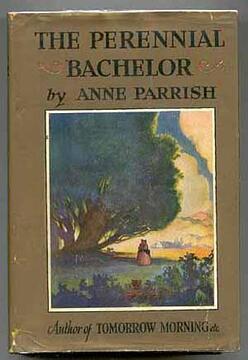
Her finest story may be The Perennial Bachelor, set in the 19th century and published in 1925. (To give you an idea of how popular she was, its first printing was in June of 1925; my copy, from its seventh printing, was published in September of that same year.)
I’m only guessing, since it can be difficult to find reviews of books written almost a century ago. But I have to think that one reason for Parrish’s popularity was her insight into the human heart. For instance, here’s a passage from The Perennial Bachelor – a description of the impoverished heroine’s visit to the house she’d lived in all her life, now owned and newly remodeled by a wealthy family:
- “No matter what changes they made, Maggie thought, she could keep The Maples unchanged in her heart. When her home had been hers, she had never been able to hold it – the leaves fell, sunsets faded, darkness drank up the river, everything changed and passed like flowing water. But now that she had lost it, it was hers forever, immortal.”
This is certainly true of places that have been dear to us; I personally spend a great deal of time remembering, room by room, the house I grew up in, as well as the homes of my little friends.
But it’s true, too, of our loved ones, and especially as we lose them to age and death. The longer these loved ones live, the less we are able to hold them, and the more painful it becomes to watch them deteriorate physically, mentally and emotionally. We may perhaps be able to relieve one source of misery today, but it will only be replaced by others tomorrow. And along the way, we become so preoccupied with the dying that we lose our beloved, often long before he or she draws that final breath.
Ah, but then: Death not only frees our loved one from this decay; it frees us from the anguish of good-bye and into our fondest memories. To paraphrase Parrish, “Now that I have lost her, she is mine forever, immortal.”
Of course, when this process involves followers of Jesus Christ, death is merely a temporary separation that will culminate in blissful reunion and eternal joy. And those wonderful memories provide exquisite comfort in the interim; surely that was by His design.
Not so for the thoughtful unbeliever. He must realize early on that nothing can be his forevermore. And surely that must turn even the loveliest memories bitter.
Fortunately, there’s good news for all: As long as we have breath, it’s not too late to receive the free gift of eternal life. You can do it today; and so can your loved ones. And then you can truly belong to each other “forever, immortal.”

 RSS Feed
RSS Feed